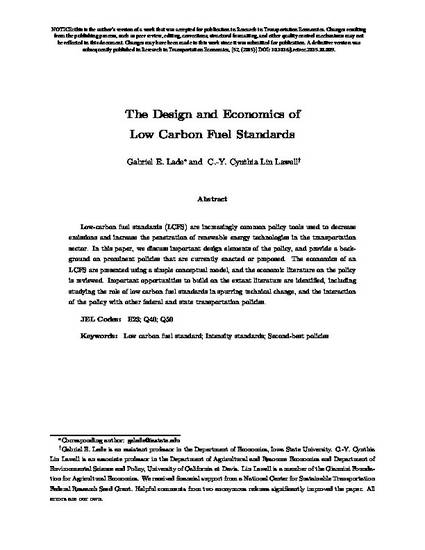
Article
The Design and Economics of Low Carbon Fuel Standards
Research in Transportation Economics
Document Type
Article
Disciplines
Publication Version
Submitted Manuscript
Publication Date
1-1-2015
DOI
10.1016/j.retrec.2015.10.009
Abstract
Low carbon fuel standards (LCFS) are increasingly common policy tools used to decrease emissions and increase the penetration of renewable energy technologies in the transportation sector. In this paper, we discuss important design elements of the policy, and provide a background on prominent policies that are currently enacted or proposed. The economics of an LCFS are presented using a simple conceptual model, and the economic literature on the policy is reviewed. Important opportunities to build on the extant literature are identified, including studying the role of low carbon fuel standards in spurring technical change, and the interaction of the policy with other federal and state transportation policies.
Copyright Owner
Elsevier Ltd.
Copyright Date
2015
Language
en
File Format
application/pdf
Citation Information
Gabriel E. Lade and C.-Y. Cynthia Lin Lawell. "The Design and Economics of Low Carbon Fuel Standards" Research in Transportation Economics Vol. 52 (2015) p. 91 - 99 Available at: http://works.bepress.com/gabriel-lade/5/

NOTICE: this is the author’s version of a work that was accepted for publication in Research in Transportation Economics. Changes resulting from the publishing process, such as peer review, editing, corrections, structural formatting, and other quality control mechanisms may not be reflected in this document. Changes may have been made to this work since it was submitted for publication. A definitive version was subsequently published in Research in Transportation Economics, [52, (2015)] DOI: 10.1016/j.retrec.2015.10.009.